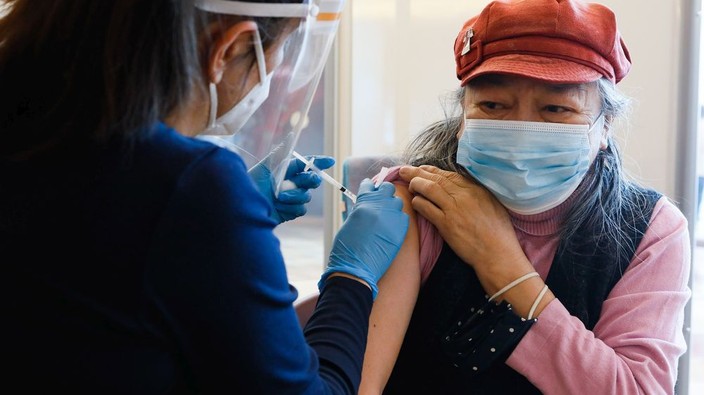receiving two doses of some of the most common covid vaccines offers almost as much protection against the delta variant of the virus as the initial alpha strain, according to a new study.the new study, published wednesday in the
new england journal of medicine, found that two doses of pfizer were 88 per cent effective against symptomatic disease from delta — only slightly below its 93.7 per cent effectiveness against the original strain.astrazeneca is similarly effective against both strains: it’s 67 per cent effective against delta, and 74.5 per cent effective against alpha. both of those numbers are higher than original estimates.the new research lines up with the findings of
a french study from earlier this month, as well as research from
public health england in the spring. researchers found the pfizer and astrazeneca vaccines offered significant protection against the delta variant. the moderna vaccine was not part of any of these studies, but
separate research has found it to be effective in warding off variants as well.the effectiveness of a double vaccine dose against the variants was first reported by public health england in may: “only modest differences in vaccine effectiveness were noted with the delta variant as compared with the alpha variant after the receipt of two vaccine doses,” researchers wrote. that study also found that the pfizer vaccine was 88 per cent effective against delta, compared to 93 per cent effective against alpha.“this new evidence is groundbreaking, and proves just how valuable our covid-19 vaccination programme is in protecting the people we love,” the u.k.’s health and social care secretary
matt hancock said at the time. “it’s clear how important the second dose is to secure the strongest possible protection against covid-19 and its variants.”and research from
france’s pasteur institute earlier in july found that while a single pfizer or astrazeneca shot “barely inhibited” delta, a double dose of vaccines caused a “neutralizing response” in 95 per cent of test subjects.
this week’s confirmation of those findings is welcome news, given the rise of the
lambda variant as well as a slightly different version of delta known as delta plus. it’s not different enough to be considered an entirely separate variant, but delta plus has one major difference from regular delta: a mutation on the virus’ spike protein.this could potentially be a problem,
forbes explains, since the vaccines have been designed to trigger an immune response against the spike protein. the indian government has labeled delta plus a “variant of concern,”
cnn reported. but experts say it’s far too early to know if it will actually be more transmissible.
 2 minute read
2 minute read









